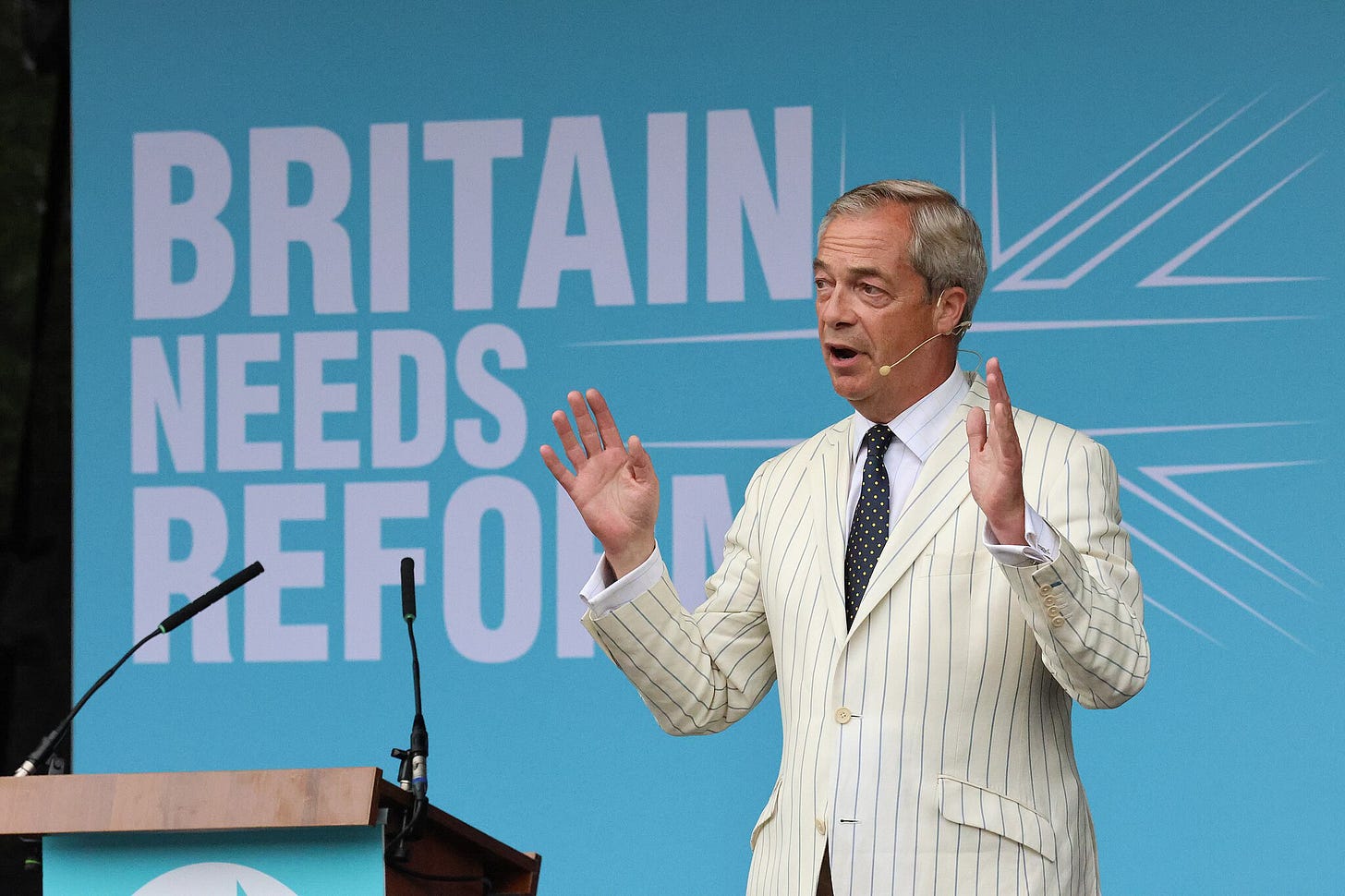Why I'm Bearish on Reform UK
Two big reasons the party is overhyped

Reform UK are on the march. Polls consistently show Nigel Farage's party within a couple of points of Labour and the Conservatives, with a recent YouGov poll even showing Reform tied with the government. On the question of best Prime Minister, Farage comes out top at 20% compared to 19% for Keir Starmer and 9% for Kemi Badenoch – though as usual, "Don't Know" is on course for a landslide.
I think this rise has come about because, at first glance, Reform occupies the "true centre" of British politics: right on culture, left on economics – the same territory that delivered Boris Johnson's landslide in 2019. Farage is - if you'll excuse the image - hitting the electorate's G-spot at a time when the main parties have never been more of a turn-off. Keir Starmer is as the most unpopular new Prime Minister on record (if you don't count Liz Truss, which I don't), and the country already resoundingly rejected the Tories last July.
Then there's immigration, now the second most important issue to voters according to YouGov. Labour are seen as a soft touch, whilst the Tories allowed net migration to hit record highs during their 14 years in office. Sunak pushed through meaningful reforms towards the end of his premiership, but voters are unlikely to credit his government for these last-minute changes. Reform, as you might expect, has gone hard on immigration, promising a "net-zero" approach with one person in, one person out.
On paper, the government has plenty to fear. Reform owns one of the most salient issues, public disgust with traditional politicians is at a high, and the party's positioning here aligns perfectly with the median voter.
But I think there are two big reasons to be bearish on the party’s prospects.
In fact, I'm confident Reform won't come close to power never mind official opposition status come 2029. The problem is that there's a fundamental disconnect between the party's image and the ideological DNA of its leaders. This contradiction has gone largely unchecked while Reform was dismissed as a protest vehicle. But now they're riding high in the polls and being taken seriously by the larger parties, the scrutiny is coming – and nowhere are they more vulnerable than on healthcare.
I'm confident Reform won't come close to power never mind official opposition status come 2029.
Reform UK presents itself as right on culture and left on economics, and in many ways it is. The party wants to slash immigration and wage war on "woke" while also promising to nationalise water companies and bemoaning Britain's deindustrialisation. But Nigel Farage and Richard Tice – the party's leader and deputy leader respectively – are fundamentally Thatcherites, albeit ones who've fallen out of love with globalisation. They believe in capitalism until it interferes with their conception of "the nation," at which point they're suddenly eager interventionists. Their instincts couldn't be further from the leftism of the 1970s dockyard or coal mine.
The party's 2024 manifesto perfectly illustrates this contradiction. It promised £90 billion in tax cuts while simultaneously pledging massive increases in public spending – a circle that simply can't be squared. This kind of policy incoherence doesn't always hurt insurgent parties in opposition – the Lib Dems managed to be all things to all people throughout the noughties, providing a home for anti-Iraq War leftists, angry students, and liberal Tories alike. Of course, that strategy imploded once they reached government, but Reform's particular brand of incoherence won't even get them that far.
That's because for all Farage's undeniable political talents, he has terrible instincts on some key issues, promoting positions that are poison to Reform's target voters. Healthcare is the most glaring example. Farage has long advocated dismantling the NHS in its current form, calling for the introduction of charges whilst leader of UKIP. More recently, Reform has championed the French model, where healthcare is delivered by the private sector with the state typically covering 70% of medical fees (rising to 100% for chronic conditions or low-income patients), while regulated insurance covers the rest.
France has much better health outcomes than the UK and is one of the models I would personally be looking at to replace Britain’s outdated and overburdened health service. It’s a rare issue where I don’t entirely disagree with Farage. But my own views are besides the point if we’re purely considering the politics.
Healthcare ranks alongside immigration as a top concern for British voters, and for most people, healthcare means the NHS, full stop. Any hint of reform gets branded as privatisation, regardless of merit. There's a reason the Tories' successful 2019 strategy has been described as "hang the paedos and fund the NHS." Reform's healthcare policy is anathema to the very voters they're trying to reach. Just 2% of C2DE voters – the working-class base Reform claims to represent – support full NHS privatisation. It's hard to imagine a more politically toxic position.
Previous attempts to challenge Reform or Farage's other vehicles have faced two key disadvantages. First, Farage has always been the outsider, never facing serious scrutiny as a potential Prime Minister. This allowed him to run primarily on one or two salient issues where he aligned perfectly with a large chunk of voters (first Brexit, then immigration). That's changing now. Reform is emerging as a credible electoral threat, even if they're not a credible governing party.
When voters consider Reform at the next election, they'll be weighing them as a potential government, not just a protest vote. Suddenly, people are asking about Reform's policies on tax, crime, and yes, healthcare. They won't like what they find.
Second, mainstream parties have historically felt compelled to meet Farage on his chosen battleground, trying to out-tough him on Brexit or immigration. That's always been a losing game. But this dynamic is shifting too. As voters examine the broader implications of a Reform government, the party will have to fight on territory where mainstream parties are stronger. The NHS will matter – it always does.
If Labour is smart, they'll aggressively paint Farage as the enemy of the NHS. This won't make Reform irrelevant, there is a block of 10-15% of the electorate who do share their weird politics, but it does give them a ceiling. I can't see them pushing much beyond their 2024 vote share. Farage simply isn't cut from the same cloth as the political movement he's trying to lead.
This is better news for Labour than the Conservatives. The electoral maths remains brutal for the Tories while Reform polls in the high teens – they simply can't form a government with Reform taking that much of their vote. But trying to out-Farage Farage would be disastrous, only forcing more policy discussions onto his turf while driving globalist Tories toward the Lib Dems. Some Conservatives dream of "uniting the right" through a Reform-Tory merger, forgetting that a crucial segment of the right has already defected to the Lib Dems and Labour.
Counter-intuitively, Trump's return to the White House will hurt rather than help Reform. According to the National Institute of Economic and Social Research, Trump's proposed tariffs could devastate the UK economy. Their analysis suggests British GDP could decline by up to 2.5% within three years, with exports falling by £22 billion. Sterling might depreciate 10-15%, driving inflation up by 3 percentage points and forcing the Bank of England to hike interest rates dramatically. This means higher prices, more expensive mortgages, and fewer jobs, particularly in sectors like fishing, mining, and manufacturing that Reform claims to champion.
Trump is deeply unpopular with British voters already. As Americans endure four more years of economic nationalism and trade wars, voters will keep being reminded of how much Trump's policies hurt their wallets – and then they'll look at Reform as his closest British analogue.
Reform is the only UK party whose supporters view Trump positively, but even 30% of their 2024 voters dislike him. And the reality is that if Reform are to become more than just a protest movement they need to expand beyond their current base. This is why Kemi Badenoch's strategy of distancing the Conservatives from Farage – at least rhetorically – is smart politics. The Tories need to position themselves as the serious right-wing alternative, the only party capable of “replacing this incompetent government."
The stars will align for Reform's opponents over the next few years. Reform's healthcare problem isn't going away – and neither is Trump. Watch this space.
Thank you for reading Otters and Insights, if you’ve enjoyed this piece then please consider subscribing, it’s free and you have nothing to lose except a tiny portion of your life. You can find me on BlueSky @jackrowlett.bsky.social



